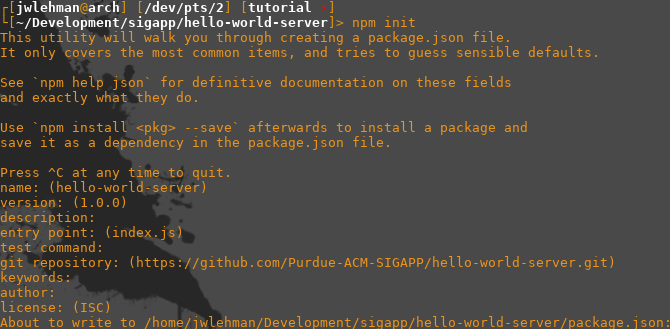Creating an express server
First
Create your Hello-World-Server directory and enter it
mkdir Hello-World-Server
cd Hello-World-Server
Starting a Node project
Run npm init at the root of your project
It should look like this:
 Just keep pressing enter, edit fields as you feel necessary
Just keep pressing enter, edit fields as you feel necessary
package.json
cat package.json
It should look like this:
{
"name": "hello-world-server",
"version": "1.0.0",
"description": "",
"main": "index.js",
"scripts": {
"test": "echo \"Error: no test specified\" && exit 1"
},
"repository": {
"type": "git",
"url": "git+https://github.com/Purdue-ACM-SIGAPP/hello-world-server.git"
},
"author": "",
"license": "ISC",
"bugs": {
"url": "https://github.com/Purdue-ACM-SIGAPP/hello-world-server/issues"
},
"homepage": "https://github.com/Purdue-ACM-SIGAPP/hello-world-server#readme"
}
Install express
npm i -S express
Create your first server!
Create file Hello-world-Server/index.js and add the following:
var express = require('express')
var app = express();
app.get('/', function(req, res) {
res.send('Hello, World')
});
app.listen(3000, function() {
console.log('Listening on port 3000');
});
module.exports = app;
Run your server!
run node index.js at the root of the project (Hello-World-Server/)
Check it out in your favorite browser at localhost:3000
Creating a router
Create an app directory, and place a routes directory inside of it.
mkdir -p app/routes
Add the following to this new index.js file:
var express = require('express');
var router = express.Router();
router.get('/', function(req, res) {
res.send('Hey, I am the root route');
});
router.get('/message', function(req, res) {
res.send('You asked for a message, so now you have got one!');
});
module.exports = router;
This is a router, which will specify what our server should be returning to a user when they ask for certain routes. In this example, if they request /, it will return the string Hello, World and if they request /message, it will return You asked for a message, so now you have got one!.
Modify Hello-World-Server/index.js
Now we will add this new router to our root index.js file.
Note: This should not be the file you were just editing, but the index.js file at the root of your project.
var express = require('express');
var routes = require('./app/routes');
var app = express();
app.use('/', routes)
app.listen(3000, function() {
console.log('Listening on port 3000');
});
module.exports = app;
Run it!
yet again, run node index.js at the root of the project, and check out your brand new fancy, schmancy routes at localhost:3000 and localhost:3000/messages